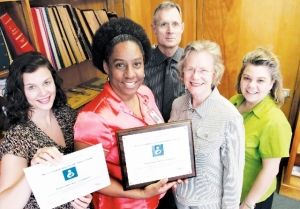Wayne County Health Department program receives honors
By Phyllis Moore
Published in News on April 24, 2011 1:50 AM

News-Argus/MICHAEL BETTS
Pictured from left are Elizabeth Hill, Wayne County Health Department breastfeeding peer counselor program manager; Lanika Case, WIC breastfeeding coordinator; James Roosen, health director; Carroll Beckham of the Breastfeeding Coalition; and Stephanie Howard, WIC director.
Wayne County Health Department has been recognized for its efforts to promote a healthier start for babies and mothers -- breastfeeding.
Two awards were recently received from the N.C. Breastfeeding Coalition, the Breastfeeding Friendly Business Award and Breastfeeding Friendly Workplace Award. The former went to the Health Department as a whole, and the latter was presented to WIC, or the Women Infant and Children section.
"It means that we have practices in place that support not only our clients, our community, but also for our staff," Lanika Case, breastfeeding coordinator with WIC, explained to the Board of Health Wednesday.
One of the program's main components is breastfeeding and its advantages for both mother and child, added Stephanie Howard, program director.
In addition to providing a private room on the first floor of the Health Department, accessible to both staff and clients, there is a similar area available in the WIC modular unit. Other components of the initiative include paid maternity leave, a refrigerator on-site to store breast milk, staff training and education for expectant mothers.
The office currently serves about 300 nursing mothers, said Elizabeth Hill, breastfeeding peer counselor program coordinator, who pointed out the importance of continuing the practice for it to be effective.
"The state really looks at not just who's initiating but having moms continue to breastfeed at six weeks, six months," Ms. Hill said.
The health benefits from breastfeeding for at least six months to one year range from cost savings and the child having fewer ear infections and childhood diseases to preventing some health problems, including several cancers, in mothers.
Of its clientele, Ms. Case said approximately 25 percent currently breastfeed.
"That's up from about 22 percent with the last set of statistics that I have," Ms. Howard told the board.
Education is key, Ms. Hill said, with the ideal time to begin being before the baby is born. For the most part, she added, parents are receptive to the idea, although the Latino population seems to be lagging behind in that area.
Board member Maria Alejandra Tinajero agreed that breastfeeding is best for babies, so if there is a problem getting the Latino mothers on board, it might be due to the language barrier. She suggested finding an alternative approach rather than "handing them a lot of papers" that might be thrown away.
Ms. Hill agreed, saying the biggest challenge has been among those "not literate in either Spanish or English" and that they tend to engage better in small groups of their peers.
The office also offers a number of free services, Ms. Case said, including breast pumps to those who qualify, makes referrals to lactation consultants and groups like LaLeche League, and hopes to have its own support group in the near future.
